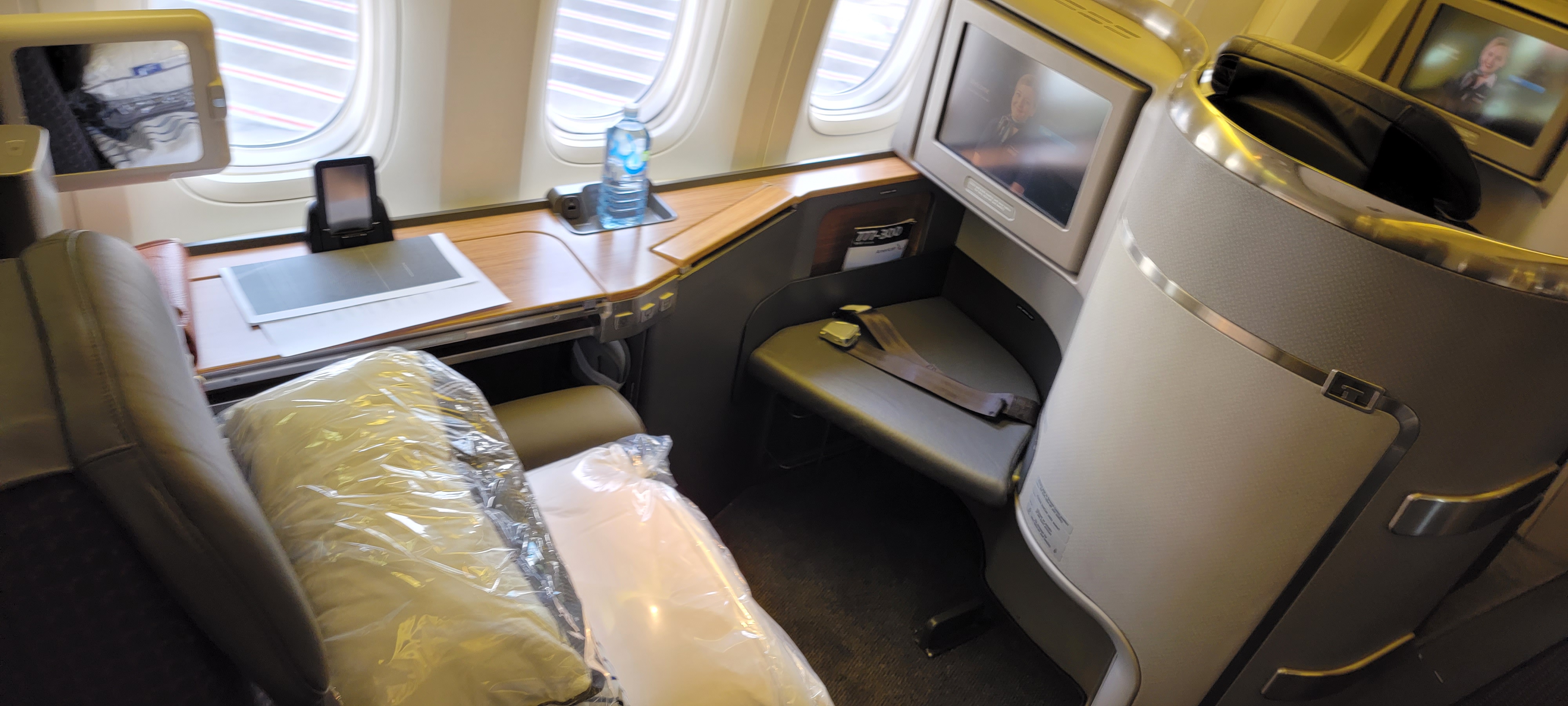The Global Loyalty Organization hosted loyalty leader predictions for 2024. A lot of it was milquetoast, and not really actionable, as so much corporate speak is wont to be. But there were a few real insights here. Four things especially stood out.
- Revenue-based status. Ben Lipsey who runs Air France KLM’s Flying Blue points out that Delta’s move to fully revenue-based status follows American. (The details are of course different, with American’s status levels far more attainable and many more activities with partners counting.) United has moved somewhat in that direction – they were first to say that ticket spend and not miles or flights is what mattered, and have now moved a little more towards credit card spend counting towards status. With the 3 largest U.S. airlines doing it, that’s a trend the world will be paying attention to.
Frequent flyer programs are now “frequent spender” programs, which won’t work as well in Europe (unmentioned is credit card interchange limits which make selling miles to banks less profitable).

- Experiences over stays. Mehdi Hemici from Accor says that emotional loyalty is created through access to experiences. The problem is that unique experiences, which members cannot access on their own without the program, are difficult to scale. And they’re difficult to match. I gave a talk to brands issuing Mastercards around six years ago telling them that to take advantage of Priceless Experiences they needed AI, learning about spend patterns and upcoming travel plans, to match customers with opportunities, because almost nobody scours the platform to come up with the right opportunity at the right time.


- Simplification. Hemici says points and ‘point scales’ (award charts) are “difficult to comprehend so Accor does 2000 points = 40 Euros. That’s fine as far as it goes but it eliminates the opportunity for outsized value, the opportunities that actually create the emotional loyalty he emphasizes. You can always get simple average value but you might as well get a cash back card and not a co-brand (outside of contributions to status), because you’ll never leverage the program’s scale as the largest buyer of their company’s travel and its ability to liquidate unsold inventory at a discount to get access to travel you’d otherwise not be able to afford.
- Loyalty is the brand. Kristi Gole, head of product for GHA, pointed out that Marriott’s new brand “Apartments by Marriott Bonvoy” doesn’t just have the chain’s name it has the loyalty program’s name.
When Marriott bought Starwood, then-CEO Arne Sorenson argued that they needed need to invest in marketing for what would become 30 brands (and thus the brands didn’t even need to be that differentiated), all they needed was a sticky loyalty program and then customers would go to their website and book the hotel choices they were given.
It used to be that brands leveraged names you knew, and companies invested in those brands. Starwood tried to graft ‘good’ brands onto others (Element by Westin, Aloft by W). Now Marriott is grafting the loyalty program onto the rooms. Think of it as co-branded apartments, to replicate the success of co-brand cards.

- Sustainability. This was raised by the COO of SkyTeam, and this is far more important in Europe than in the United States except that it matters a great deal to the current Administration here and there’s significant jockeying for subsidies.
For hotels, at the high end sustainability is part of marketing to customers so that they can tell stories to themselves about who they are through their travels and at the middle and lower ends it’s usually about cost-cutting.
It’s one thing to talk about revenue-based status. It’s another to ask, which revenue? Frontier was actually ahead of American in counting all spend towards elite status. American realized that all mileage sales are much higher margin than flying people in planes.
Not all American activity counts towards status, loyalty points are also an opportunity to sell a new currency (without travel liability) to partners for incremental revenue. But American comes closest to rewarding the high margin activity they want to see from partners.
Ironically, because American underinvests in technology, ancillary revenue related to flights, like buy ups from coach to first class, don’t count towards status. So they have a ways to go! But they’re still ahead of other airlines here.
Meanwhile ‘simplification’ like ‘sustainability’ has often been a euphemism for devaluation. But if there’s one core point that loyalty executives ought to take away it’s that brands are harder to build and easier to destroy than ever before. Loyalty programs are a way to create not just permission-based marketing but really personal marketing. Even where a customer doesn’t trust the brand, they can trust the loyalty program, and then that trust carries over.
Fundamentally the idea of a loyalty program is based on trust. A customer is promised future benefits in exchange for their business up front. That’s one reason by the way that banks have to give up front bonuses to customers to take their rewards cards – it isn’t just to make those cards focal, but to frontload the opportunity to redeem, to convince the customer they’ve made a good decision, and get that customer to use the product more. Once the big investment is made in acquiring a customer, and realizing that the customer is valuable, it’s a big risk to undercut that value relationship.


Marriott doesn’t seem to care in the least about undercutting the value of loyalty relationships. In fact they make it pretty clear that they view engaged loyalty members in an antagonistic fashion rather than as partners.
Delivering memorable experiences takes well-trained people who love their jobs and customers, and the hotel chains don’t have them.
“Sustainability” as a concept has degenerated into code for “Provide the guest less, charge the guest more, pretend we’re saving the earth together.” It’s just a way to shrink and degrade the customer offer while humming a virtuous tune.
Loyalty is all about credit cards.. Interchange fees are useful but the real objective of the credit card is to trap stupid or desperate customers who’ll carry a balance at colossal interest rates of 20% plus.
Marriott, for example, doesn’t care if sensiblet people spurn Bonvoy. The reason for Bonvoy’s dreadful performance, it’s just a way to get rid of sensible clients who pay off their cards each month and attract only the fast-growing uneducated section of the US population.
I’ve quit caring about loyalty programs. Like what’s said in this article, getting a good cash back credit card is far more profitable than a fake loyalty program that’s constantly looking for the next way to devalue itself (both monetarily and enjoyability) while making reaching any status even less realistic or desirable. Then the credit cards fake higher offers but suck it all back in annual fees. (A good cash back card doesn’t.)
What’s worse is the hotels who franchise out and don’t regulate expectations or guest treatment. It’s been a long time since brands actually gave a crap about how those operating under their names actually treated their customers. Now days the only expectation you can have about a brand knockoff (franchise / partnership / operating as or under) is that you’ll be able to find the listing for said POS on the bigger brand’s app / site. It doesn’t mean they’re equally as good, or that you’ll get anywhere near the same experience with another one. It means nothing more than that you’ll see the logo.
I’m loyal to whoever is currently giving me good customer service and a decent product. As soon as that stops, so does my loyalty. And if my experience is bad enough, or consistently not very good, then my business will stop coming their way forever or at least until their entire company is revamped and proves it will stay that way for the long term.
I’m sorry. “Experiences rather than Stays” seems to be Hyatt’s new mantra. As a “road warrior” (and Lifetime Globalist) I don’t have time for “experiences” (whatever they are – can someone educate me please?). I want my Hyatt benefit and Regency Club.
A lot of wisdom in this post. For example: “For hotels, at the high end sustainability is part of marketing to customers so that they can tell stories to themselves about who they are through their travels and at the middle and lower ends it’s usually about cost-cutting.” This just about sums up everything in the travel industry. You either get the PBS donor/Rick Steve’s fan who tells you what a smart traveler they are and how awesome and rewarding it was to stay at the Marriott/Hyatt /Hilton/Intercontinental/etc. because they got to personally know their local bellhop and save polar bears by hanging up their towel while enjoying the free bamboo toothbrushes OR you get the construction worker outside of Grand Forks that got screwed by the Days Inn because they didn’t give him any bar soap so they could save Alaskan Turtles or donate to save rainforests in Arizona.
The other problem with most of these programs is they like to use the word “loyalty” but it seems to be a one-way street to their bank, not so you get much benefit (or at least less benefits than in the past).
The “experiences” they offer seem to mostly be something I can never use (I assume many can’t) like some famous chef dinner in Manhattan or a concert by some “famous” bank you’ve never heard of in LA or maybe if you’re lucky it will be good seats at a Cricket match in Houston or whatever.
Loyalty programs have evolved to personalized discount/rebate programs. Public companies with large loyalty programs should allow an option to convert loyalty earnings into stock shares of the issuing company. Who’s a more loyal customer than an owner? LoyaltyShares has vetted it through the SEC
In Europe, “Sustainability” is only a big deal to media, journalists, politicians and marketing departments. Just a very small minority cares about that enough to pay a premium for that.
“Experiences” suck.